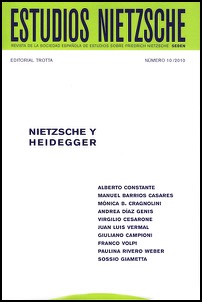Zarathustra’s Animals: Heidegger and Nietzsche . on the Question of Living Animal
DOI:
https://doi.org/10.24310/EstudiosNIETen.vi10.10182Keywords:
animality, subjectivity, overmanAbstract
The place of animality in the work of Nietzsche, mainly in Thus Spoke Zaratustra, is a key point to understand the path toward the Uebermensch. Heidegger’s approach to this question in Nietzsche must be thought in the line of the interpretation of a thinker that deepens nihilism, and of the representative metaphysics that dominates all the earth. This paper examines some problematic aspects of this interpretation, and tries to show
the importance of another way to think the notion of animal in Nietzsche.
Downloads
Metrics
References
Ávila, R., El desafío del nihilismo, Madrid: Trotta, 2005.
Calder III, W.M., «The Lion Laughed»: Nietzsche-Studien 14 (1985).
Carrasco Pirard. Carrasco, Para leer Así habló Zaratustra de F. Nietzsche, Chile: Editorial Universitaria, 2002.
Cragnolini, M. B., «De Bactriana y el Urmi a la montaña y el ocaso. A modo de introducción a Así habló Zaratustra»: Revista de Filosofía LV-LVI (2000), 39-56. Cragnolini, M. B., «El oído de Heidegger en la cuestión de lo viviente animal»: Nombres. Revista de Filosofía, XVIII/22 (dic. 2008), 103-113.
Cragnolini, M. C., «Ciberespacio y potencia de suspensión», en G. Kaminsky et alt., Bartleby: preferiría no. Lo bio-político, lo posthumano, Buenos Aires: La Cebra, 2008, pp. 61-72.
Cragnolini, M.B., Nietzsche, camino y demora, Buenos Aires: Eudeba, 1998. E. de Fontenay, Le silence des bêtes, La philosophie à l’épreuve de l’animalité, Paris: Fayard, 1998.
Derrida, J., El animal que luego estoy si(gui)endo, trad. C. de Peretti y C. Rodríguez Marciel, Madrid: Trotta, 2008.
Esposito, R., Immunitas. Protezione e negazione della vita, Torino: Einaudi, 2002.
Fink E., Nietzsches Philosophie, Stuttgart: Kohlhammer, 1960.
Gooding-Williams, R., Zaratustra’s Dionysian Modernism, Stanford University Press, 2001.
Haar, M., «Heidegger: une lecture ambivalente»: Magazine littéraire 298 (abril 1992), 95-96.
Haar, M., «Les animaux de Zarathoustra. Forces fondamentales de la vie», en Par-delá le nihilisme, Nouveaux essais sur Nietzsche, París: PUF, 1998, pp. 199-218.
Heidegger, M., Nietzsche, Barcelona: Destino, 2000.
Heidegger, M., Holzwege, Pfullingen: Neske, 1956.
Loeb, P. S., «Zaratustra’s Laughing Lions», en C. Davis Acampora - R. Acampora, A Nietzschean Bestiary.
Becoming Animal Beyond Docile and Brutal, Lanham (MD): Rowman & Littlefield, 2004, pp. 121-139.
Loeb, P. S., «The Conclusion of Nietzsche’s Zaratustra»: International Studies in Philosophy 32/3 (2000), 137-152.
M. B Cragnolini, M. B., - G.Kaminsky, Nietzsche actual e inactual, Buenos Aires: Oficina de Publicaciones del CBC, 1996, vol. II, pp. 99-122.
M. Heidegger, Los conceptos fundamentales de la metafísica. Mundo, finitud, soledad, trad. de A. Ciria, Madrid: Alianza, 2007.
Martins, A., «Romantismo e tragicidade no Zaratustra de Nietzsche», en Cadernos Nietzsche 25 (2009), 115-144).
Nietzsche, F., Obras Completas, I-IV (OC ). Director ed. Diego Sánchez Meca. Madrid: Tecnos, 2011-2016
Nietzsche, F., Correspondencia I-VI. (CO). Director ed. Luis E. de Santiago Guervós. Madrid : Trotta, 2005- 2012.
Nietzsche, F., Fragmentos Póstumos I-IV (FP). Director ed. Diego Sánchez Meca. Madrid: Tecnos, 2006-2010.
Downloads
Published
How to Cite
Issue
Section
License
As of issue 21 (2021) this journal is published only in open access (diamond route).
From that number 21, like the previous numbers published in NIETZSCHE STUDIES, they are subject to the Creative Commons Acknowledgment-NoComercia-ShareIgual 4.0 license, the full text of which can be consulted at <http://creativecommons.org/licenses/by-nc-sa/4.0 >
It is the responsibility of the authors to obtain the necessary permissions of the images that are subject to copyright.
This work is licensed under a Creative Commons Attribution-NonCommercial-ShareAlike 4.0 International License.
Copyright generates two different rights: moral rights and patrimonial rights that EJFB recognizes and respects. Moral rights are those relating to the recognition of the authorship. They are rights of a personal nature that are perpetual, inalienable, unseizable and imprescriptible as consequence of the indivisible union of the author and his/her work.
Patrimonial rights are those that can be derived from the reproduction, distribution, adaptation or communication of the work, among others.







11.png)
